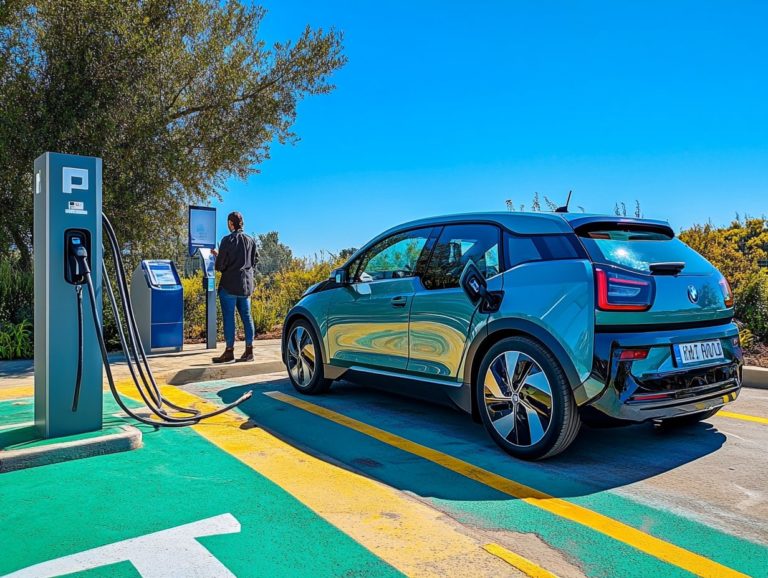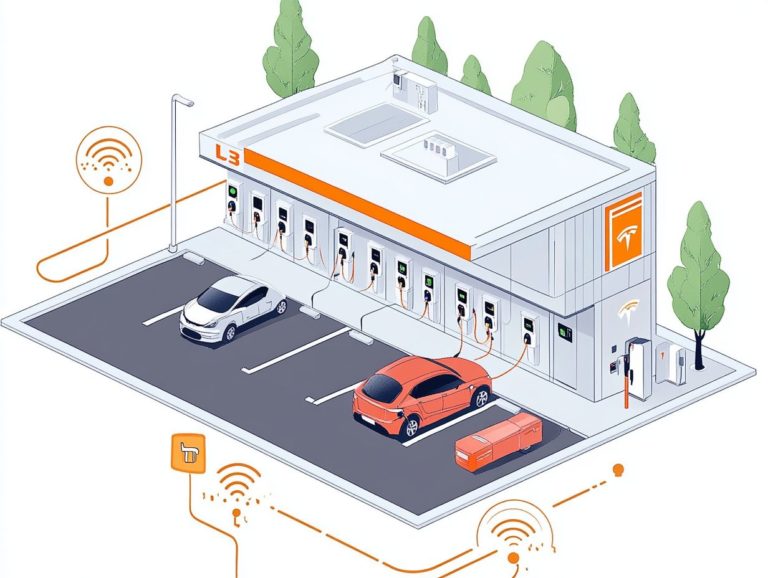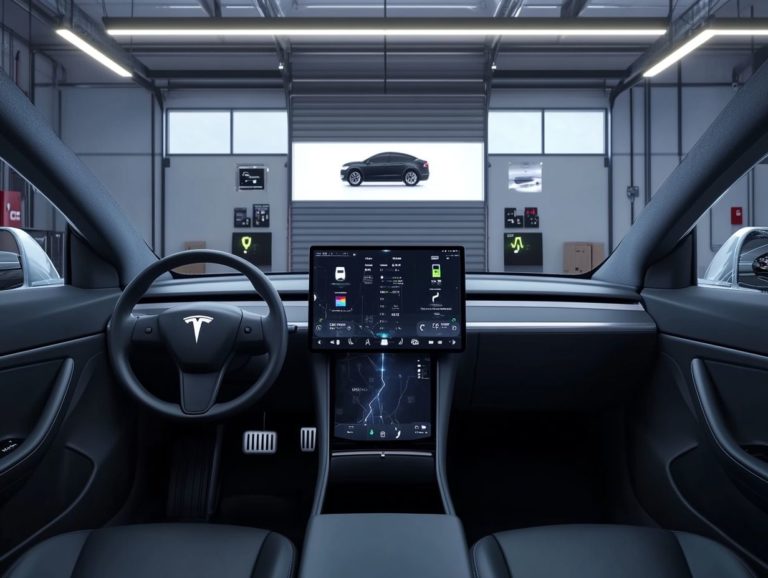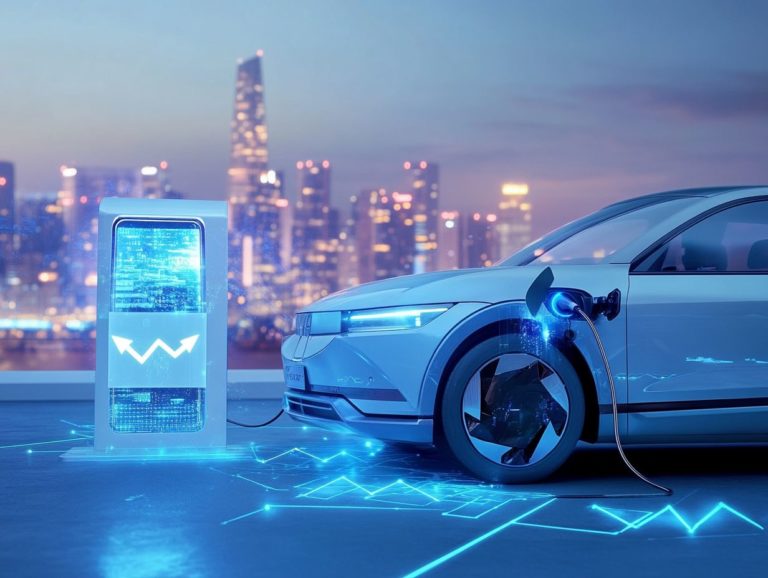Are Electric Cars Better for the Environment?
Electric cars are changing how we think about transportation and energy use.
As climate change and pollution become more pressing issues, it s crucial to understand how electric vehicles (EVs) work and their environmental benefits.
This article explores how electric cars operate and highlights their benefits in lowering emissions.
We will also compare them to traditional vehicles and take a look at what the future holds for EV technology.
Join us on this exciting journey toward cleaner, sustainable driving!
Contents
- Key Takeaways:
- Understanding Electric Cars
- Environmental Impact of Electric Cars
- Comparing Electric Cars to Traditional Cars
- The Future of Electric Cars
- Frequently Asked Questions
- Are Electric Cars Better for the Environment?
- How do electric cars benefit the environment?
- Do electric cars have any negative impact on the environment?
- How do electric cars compare to hybrid cars in terms of environmental impact?
- Are there any incentives for purchasing an electric car?
- What are some potential future developments for electric cars and the environment?
Key Takeaways:
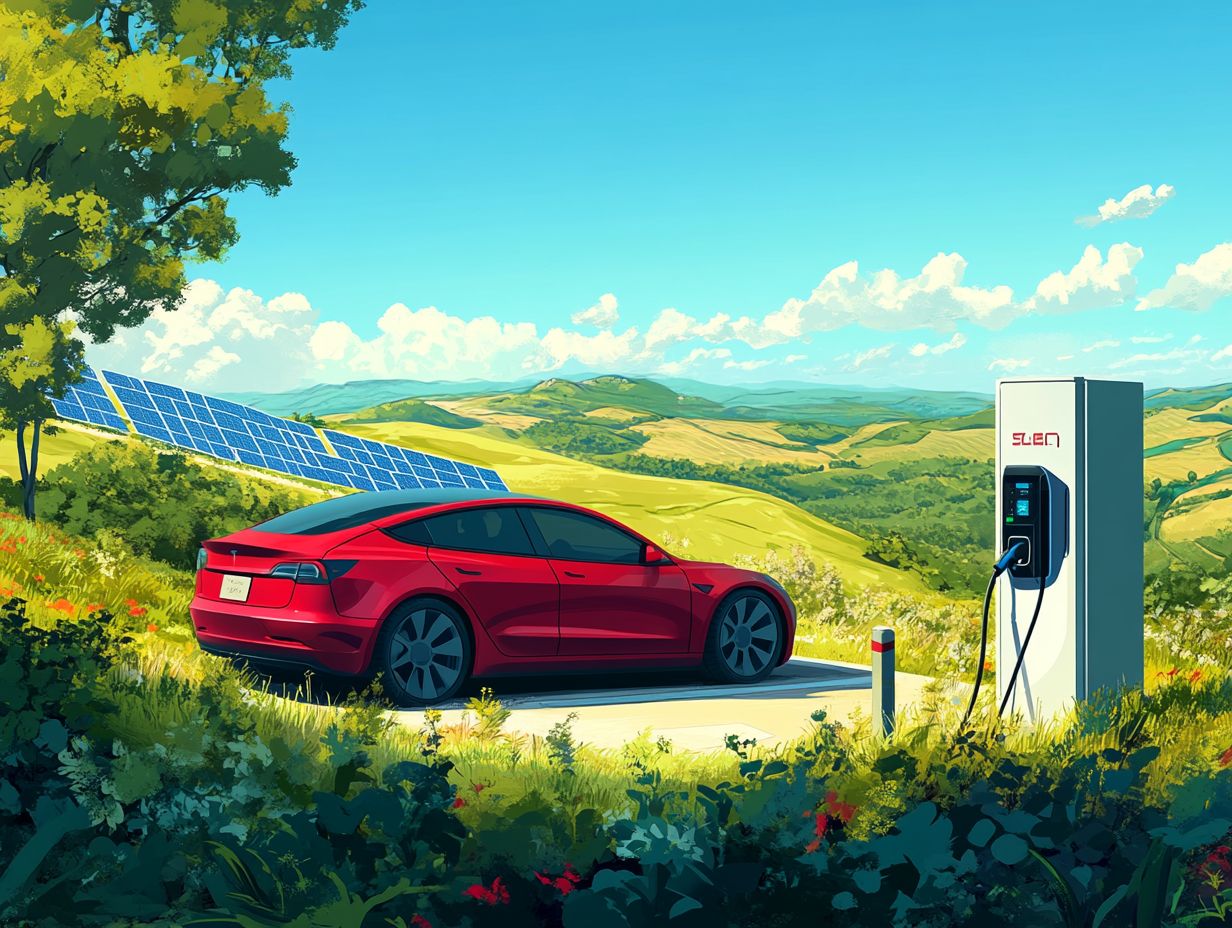
- Electric cars can greatly reduce emissions, making them a better choice for the environment.
- While challenges exist, ongoing improvements in technology and infrastructure are making electric cars more efficient and accessible.
- Compared to traditional vehicles, electric cars provide energy efficiency and potential cost savings, paving the way for a sustainable future.
Understanding Electric Cars
To understand electric cars, we need to look at the technology behind them.
These vehicles offer a cleaner alternative to gasoline cars by using electric motors and rechargeable batteries, which help cut down on carbon emissions and improve air quality. For more details, check out how electric cars impact air quality.
The electric vehicle market is growing rapidly. Advancements in battery production and government funding are helping more people choose electric vehicles.
What are Electric Cars and How do They Work?
Electric cars point the way to a sustainable future. They use electric motors powered by rechargeable batteries instead of gasoline.
These motors have different types, such as brushed and brushless DC motors, each with unique benefits that enhance performance and efficiency.
The heart of any electric vehicle is its battery, typically a lithium-ion battery, known for its energy density and long life. Innovations like solid-state batteries are promising even more efficiency and safety.
As these technologies improve, they make electric vehicles more appealing by reducing costs and enhancing the driving experience.
Environmental Impact of Electric Cars
Electric cars have a significant positive impact on the environment.
By cutting down carbon emissions and greenhouse gases, they play a key role in reducing pollution and supporting renewable energy solutions.
Reducing Emissions and Pollution
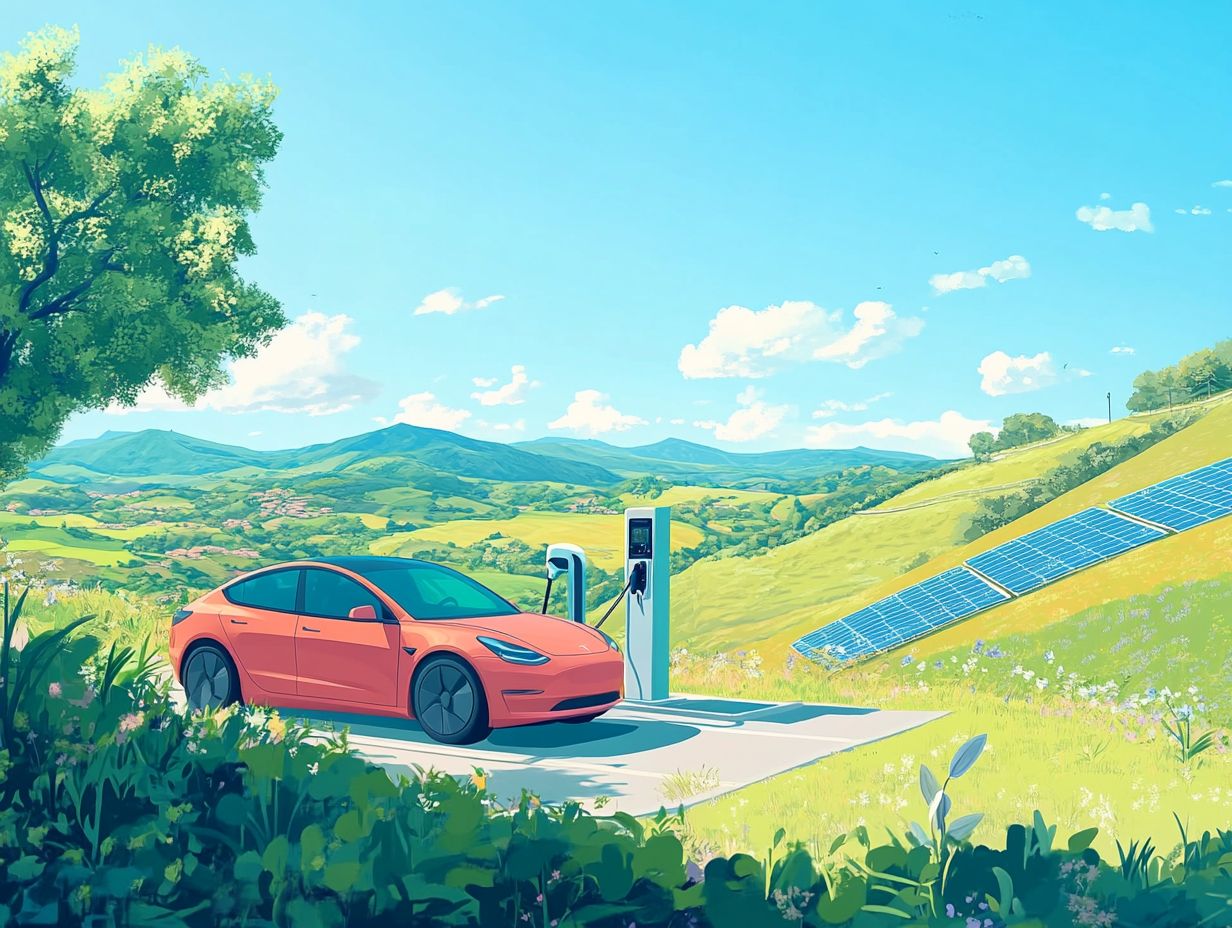
Electric vehicles are essential in the fight against tailpipe emissions, a significant driver of air pollution and climate change. By completely eliminating exhaust emissions, these vehicles contribute to improved urban air quality and reduce health risks associated with pollution, such as respiratory problems and cardiovascular diseases.
When you pair electric vehicles with renewable energy sources like solar or wind, the environmental advantages multiply. This powerful combination dramatically cuts down reliance on fossil fuels. Such a transition not only champions sustainability but also bolsters energy security by diversifying your energy options.
The resulting decrease in pollution cultivates a healthier ecosystem, benefiting both wildlife and plant life. Your investment in cleaner air today contributes to a more livable environment for future generations.
Challenges and Limitations
Despite the many advantages of electric vehicles, challenges like limited charging stations and restricted electric range still stand in the way of widespread adoption.
These obstacles can create hesitation for potential users. The lack of accessible charging infrastructure often leads to range anxiety, making them reluctant to switch from traditional gasoline-powered vehicles. Concerns about the environmental impact of used batteries also complicate the conversation. Robust battery recycling programs are essential to uphold sustainable practices within the industry.
Addressing this multifaceted issue demands collective efforts from manufacturers, governments, and consumers alike to pave the way for a more electrified future.
Comparing Electric Cars to Traditional Cars
When you compare electric cars to traditional gasoline vehicles, several key factors come into play. Consider aspects such as energy efficiency, long-term cost savings, and pollution levels. Each of these elements significantly influences your decision-making process as a consumer.
Energy Efficiency and Cost Savings
Electric vehicles offer remarkable energy efficiency compared to traditional gasoline cars, delivering significant cost savings throughout their lifespan.
This efficiency arises from their ability to convert a much higher percentage of electrical energy from the grid into actual vehicle movement. Fossil fuel-based cars waste a considerable amount of energy during combustion. For example, while internal combustion engines typically operate at around 20-30% efficiency, electric powertrains can soar above 90%.
This impressive performance leads to lower fuel costs. It also reduces maintenance expenses. With fewer moving parts and no need for oil changes, electric vehicles save you time and money on upkeep.
Over time, these advantages alleviate the financial burden, positioning electric vehicles as not just environmentally friendly choices but also as economically savvy investments.
Environmental Considerations
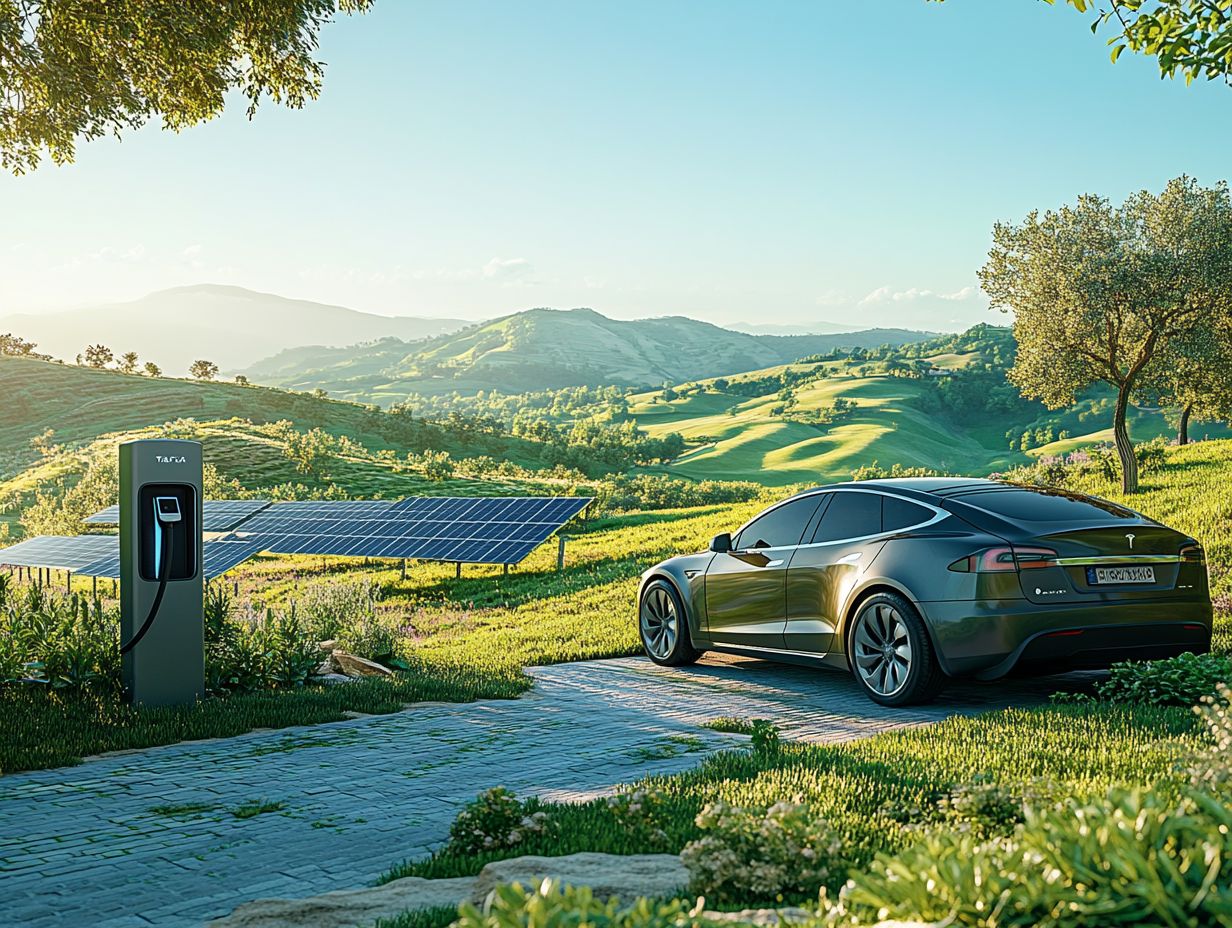
While you may appreciate the significant benefits electric vehicles offer in reducing greenhouse gases, it’s essential to consider whether electric vehicles have emissions tied to battery manufacturing and the sources of electricity you use to charge them.
The production of batteries, especially lithium-ion types, which are the most common batteries used in electric vehicles, known for their high energy density and efficiency, can impose substantial ecological impacts. Extensive mining processes can disrupt local ecosystems and contribute to carbon emissions. Additionally, the environmental footprint of charging these vehicles largely hinges on your energy mix. If you re in an area relying on coal or natural gas for electricity, you might still be producing considerable greenhouse gases.
Thus, while transitioning to electric vehicles is indeed a positive step towards sustainability, it s crucial for you to evaluate the entire lifecycle of these vehicles. Prioritizing cleaner energy sources and exploring innovative recycling methods will ensure that your shift to electric mobility aligns seamlessly with broader sustainable development goals.
Join the movement towards cleaner transportation today!
The Future of Electric Cars
The future of electric cars is exciting and full of possibilities, fueled by remarkable advancements in battery technologies and the ongoing expansion of charging infrastructure.
These developments support the growing market for electric cars, ensuring that your transition to electric mobility is not only feasible but also seamless and rewarding.
Advancements and Potential Impact
Wondering how electric vehicles enhance energy storage capabilities? Advancements in electric vehicle technology significantly promote the adoption of renewable energy as a viable climate solution.
Innovations include improved battery chemistry, increased charging efficiency, and the integration of smart grid technologies. As batteries become lighter and more efficient, your electric vehicle can store more energy, creating a crucial link between renewable energy sources and electrified transport.
This synergy maximizes the potential of solar and wind power while bolstering grid stability by facilitating demand response strategies methods that adjust energy usage based on supply and demand. Therefore, the promise of electric vehicles extends beyond personal transportation; they offer a significant opportunity for you to help reduce greenhouse gas emissions and accelerate the transition to a sustainable energy future.
Frequently Asked Questions
Are Electric Cars Better for the Environment?
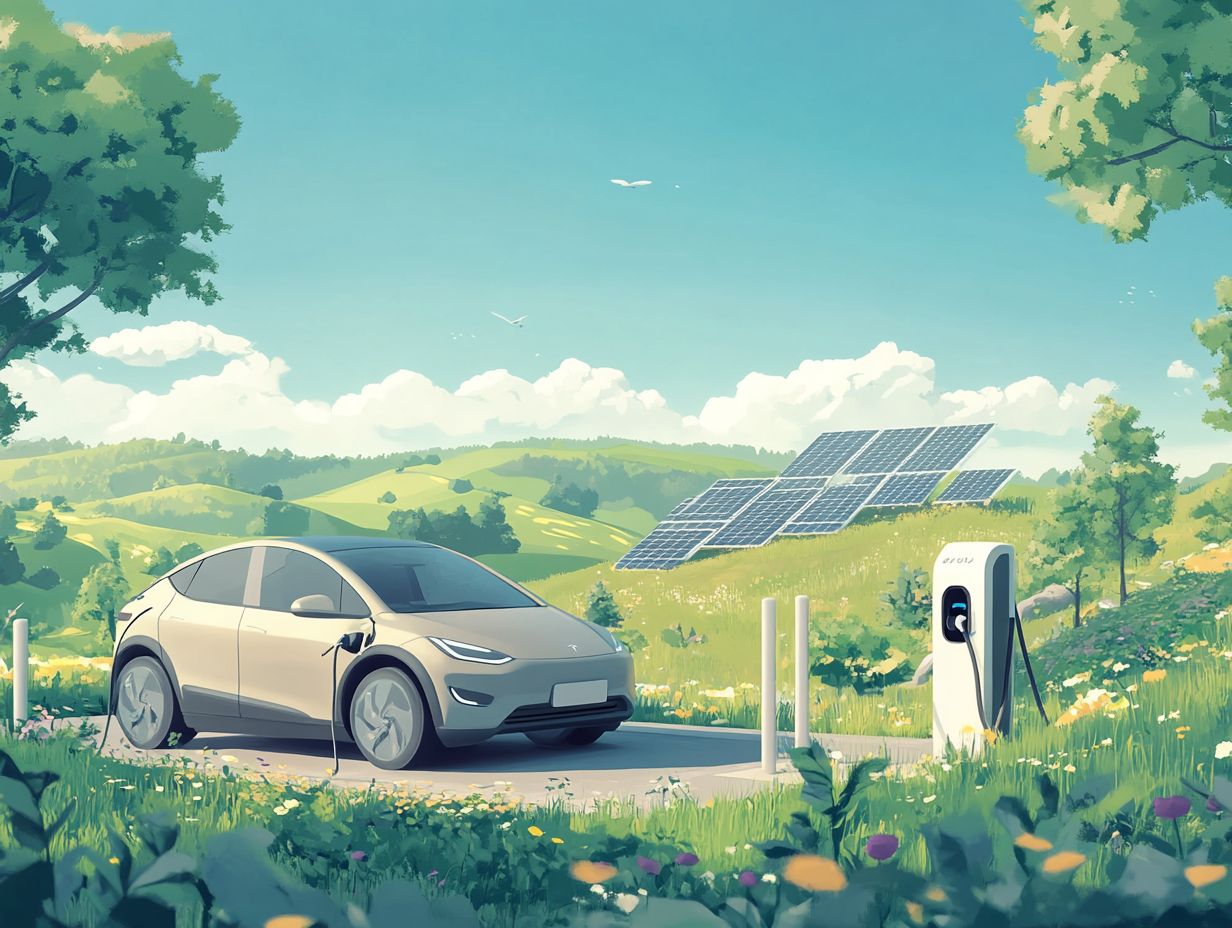
Electric cars run on electricity rather than fossil fuels like gasoline or diesel. They are promoted as a more environmentally friendly alternative to traditional vehicles. Here are some frequently asked questions about their environmental impact.
How do electric cars benefit the environment?
Electric cars have numerous environmental benefits. They produce zero emissions, meaning they do not emit harmful pollutants into the air. Furthermore, they reduce our dependence on fossil fuels and help decrease greenhouse gas emissions, which contribute to climate change. To learn more about these advantages, check out the environmental benefits of EVs. Electric cars also reduce noise pollution, improving the quality of our environment.
Do electric cars have any negative impact on the environment?
While electric cars are generally better for the environment than traditional vehicles, they do have some negative impacts. The production of electric car batteries requires significant energy and resources, which can contribute to pollution and carbon emissions. To understand the full picture, it’s important to explore whether electric vehicles are truly eco-friendly. Additionally, improper disposal of these batteries can harm the environment.
How do electric cars compare to hybrid cars in terms of environmental impact?
Hybrid cars use both a gasoline engine and an electric motor, while electric cars operate solely on electricity. While both are more environmentally friendly than traditional vehicles, electric cars have zero emissions, making them the better choice for reducing air pollution. However, hybrid cars may have a longer overall lifespan due to their gasoline engine.
Are there any incentives for purchasing an electric car?
Many governments worldwide offer incentives for purchasing electric cars, such as tax credits or rebates. These incentives encourage people to switch to electric vehicles and help offset their higher upfront costs. Some countries also provide benefits like free parking or toll exemptions for electric car owners.
What are some potential future developments for electric cars and the environment?
The technology behind electric cars is constantly evolving, and many future developments could positively impact the environment. These include advancements in battery technology to enhance efficiency and sustainability, as well as the development of renewable energy sources to power electric vehicles. Governments and car manufacturers are also working to create a more extensive network of charging stations to support the widespread use of electric cars.
Explore your options for going electric today!

